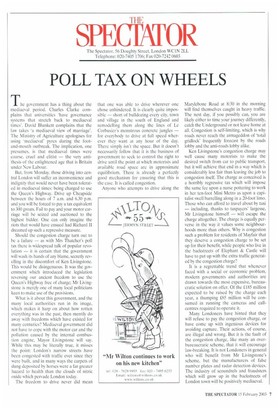POLL TAX ON WHEELS
The government has a thing about the mediaeval period. Charles Clarke complains that universities 'have governance systems that stretch back to mediaeval times'. David Blunkett complains that the law takes 'a mediaeval view of marriage'. The Minisby of Agriculture apologises for using 'mediaeval' pyres during the footand-mouth outbreak. The implication, one presumes, is that mediaeval times were coarse, cruel and elitist — the very antithesis of the enlightened age that is Britain under New Labour.
But, from Monday, those driving into central London will suffer an inconvenience and indignity that would never have been tolerated in mediaeval times: being charged to use the Queen's Highway. Drive up Cheapside between the hours of 7 a.m. and 6.30 p.m. and you will be forced to pay a tax equivalent to 300 groats. Fail to pay and your motor carriage will be seized and auctioned to the highest bidder. One can only imagine the riots that would have ensued had Richard II dreamed up such a repressive measure.
Should the congestion charge turn out to be a failure — as with Mrs Thatcher's poll tax there is widespread talk of popular revolution — it is certain that the government will wash its bands of any blame, secretly revelling in the discomfort of Ken Livingstone. This would be disingenuous. It was the government which introduced the legislation reversing our ancient freedom to use the Queen's Highway free of charge; Mr Livingstone is merely one of many local politicians keen to make use of the provisions.
What is it about this government, and the many local authorities run in its image, which makes it harp on about how rotten everything was in the past, then merrily do away with freedoms which have existed for many centuries? Mediaeval government did not have to cope with the motor car and the pollution caused by the internal combustion engine, Mayor Livingstone will say. While this may be literally true, it misses the point: London's narrow streets have been congested with traffic ever since they were built, and in many ways the carpets of dung deposited by horses were a far greater hazard to health than the clouds of nitric oxide which pervade London today.
The freedom to drive never did mean that one was able to drive wherever one chose unhindered. It is clearly quite impossible — short of bulldozing every city, town and village in the south of England and remodelling them along the lines of Le Corbusier's monstrous concrete jungles — for everybody to drive at full speed wherever they want at any hour of the day. There simply isn't the space. But it doesn't necessarily follow that it is the business of government to seek to control the right to drive until the point at which motorists and available road space are in approximate equilibrium. There is already a perfectly good mechanism for ensuring that this is the case. It is called congestion.
Anyone who attempts to drive along the Marylebone Road at 8:30 in the morning will find themselves caught in heavy traffic. The next day, if you possibly can, you are likely either to time your journey differently, catch the Underground or not leave home at all. Congestion is self-limiting, which is why roads never reach the armageddon of 'total gridlock' frequently forecast by the roads lobby and the anti-roads lobby alike.
Ken Livingstone's congestion charge may well cause many motorists to make the desired switch from car to public transport, but it will achieve that end in a way which is considerably less fair than leaving the job to congestion itself. The charge as conceived is a horribly regressive tax which will impose the same fee upon a nurse pottering to work in her ten-foot Mini Metro as upon a capitalist swell barrelling along in a 20-foot limo. Those who can afford to travel about by taxi — including, thanks to taxpayers' largesse, Mr Livingstone himself — will escape the charge altogether. The charge is equally perverse in the way it values some neighbourhoods more than others. Why is congestion such a problem for residents of Mayfair that they deserve a congestion charge to be set up for their benefit, while people who live in the backstreets of Elephant & Castle will have to put up with the extra traffic generated by the congestion charge?
It is a regrettable trend that whenever faced with a social or economic problem, modern governments and authorities are drawn towards the most expensive, bureaucratic solution on offer. Of the £185 million expected to be raised by the charge each year, a thumping 185 million will be consumed in running the cameras and callcentres required to operate it.
Many Londoners have hinted that they will refuse to pay the congestion charge, or have come up with ingenious devices for avoiding capture. Their actions, of course, are illegal and wrong. But it is the fault of the congestion charge, like many an overbureaucratic scheme, that it will encourage law-breaking. It is not Londoners in general who will benefit from Mr Livingstone's scheme, but the manufacturers of false number plates and radar detection devices. The industry of scoundrels and fraudsters which will grow up in the backstreets of London town will be positively mediaeval.


































































 Previous page
Previous page